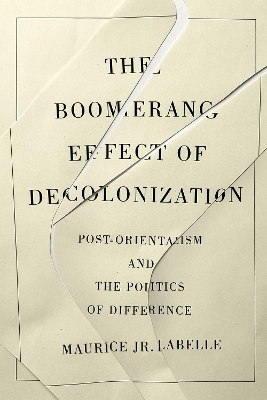
The Boomerang Effect of Decolonization
Post-Orientalism and the Politics of Difference
Seiten
2023
McGill-Queen's University Press (Verlag)
978-0-2280-1438-6 (ISBN)
McGill-Queen's University Press (Verlag)
978-0-2280-1438-6 (ISBN)
Scholars from various disciplines explore how, two decades after Aimé Césaire spoke of the imperial boomerang, Edward Said’s Orientalism represented the beginnings of his attempts to appropriate the boomerang’s recursive nature and empower decolonial processes that would transform everyone, for the betterment of all.
The 1978 publication of Edward Said's Orientalism unsettled the world. Over two decades earlier Aimé Césaire had famously spoken of the boomerang effect of colonization, which dehumanized both the colonizer and the colonized. Over time, Said and his 1978 book took Césaire’s anti-imperial critique one step further by enabling the boomerang effect of decolonization.
Inspired by that intellectual trajectory, The Boomerang Effect of Decolonization redefines post-Orientalism in a relational and integrative way. This volume draws on the reception and critique of Said’s ideas as well as his own attempts to appropriate the boomerang’s recursive nature and empower decolonial processes that aimed to transform everyone, regardless of differences both imagined and real, for the betterment of all. Reflecting upon Orientalism, its legacies, and the myriad conversations it has generated, scholars from various disciplines examine acts of anti-racism and liberation through the lens of critical race theory. Covering topics including Said’s anti-Orientalist world, Métis/Michif consciousness, writing by the French scholar Jacques Berque, the politics of allyship in the Israeli-Palestinian conflict, and the convergence between healthcare and settler-colonialism in Northwestern Ontario, contributors explore the different paths critiques of imperial cultures and their politics of difference have travelled in Canada and abroad.
Said’s Orientalism reoriented both decolonization itself and his readers’ imaginations. By redefining post-Orientalism as a relational and inclusive mode of liberation, this volume offers tools to think about difference differently, centring its anti-racist framework on the relationship between misrepresented people and their rewritten histories.
Contributors include Yasmeen Abu-Laban (Alberta), Rachad Antonius (UQAM), Sung Eun Choi (Bentley), Mary-Ellen Kelm (Simon Fraser), Allyson Stevenson (Saskatchewan), Mira Sucharov (Carleton), and Lorenzo Veracini (Swinborne).
The 1978 publication of Edward Said's Orientalism unsettled the world. Over two decades earlier Aimé Césaire had famously spoken of the boomerang effect of colonization, which dehumanized both the colonizer and the colonized. Over time, Said and his 1978 book took Césaire’s anti-imperial critique one step further by enabling the boomerang effect of decolonization.
Inspired by that intellectual trajectory, The Boomerang Effect of Decolonization redefines post-Orientalism in a relational and integrative way. This volume draws on the reception and critique of Said’s ideas as well as his own attempts to appropriate the boomerang’s recursive nature and empower decolonial processes that aimed to transform everyone, regardless of differences both imagined and real, for the betterment of all. Reflecting upon Orientalism, its legacies, and the myriad conversations it has generated, scholars from various disciplines examine acts of anti-racism and liberation through the lens of critical race theory. Covering topics including Said’s anti-Orientalist world, Métis/Michif consciousness, writing by the French scholar Jacques Berque, the politics of allyship in the Israeli-Palestinian conflict, and the convergence between healthcare and settler-colonialism in Northwestern Ontario, contributors explore the different paths critiques of imperial cultures and their politics of difference have travelled in Canada and abroad.
Said’s Orientalism reoriented both decolonization itself and his readers’ imaginations. By redefining post-Orientalism as a relational and inclusive mode of liberation, this volume offers tools to think about difference differently, centring its anti-racist framework on the relationship between misrepresented people and their rewritten histories.
Contributors include Yasmeen Abu-Laban (Alberta), Rachad Antonius (UQAM), Sung Eun Choi (Bentley), Mary-Ellen Kelm (Simon Fraser), Allyson Stevenson (Saskatchewan), Mira Sucharov (Carleton), and Lorenzo Veracini (Swinborne).
Maurice Jr. Labelle is associate professor of history at the University of Saskatchewan.
| Erscheinungsdatum | 29.12.2022 |
|---|---|
| Zusatzinfo | 2 photos, 4 tables |
| Verlagsort | Montreal |
| Sprache | englisch |
| Maße | 152 x 229 mm |
| Themenwelt | Geisteswissenschaften ► Geschichte ► Allgemeine Geschichte |
| Geschichte ► Teilgebiete der Geschichte ► Wirtschaftsgeschichte | |
| ISBN-10 | 0-2280-1438-7 / 0228014387 |
| ISBN-13 | 978-0-2280-1438-6 / 9780228014386 |
| Zustand | Neuware |
| Haben Sie eine Frage zum Produkt? |
Mehr entdecken
aus dem Bereich
aus dem Bereich
die Ukraine, Polen und der Irrweg in der russischen Geschichte
Buch | Hardcover (2023)
C.H.Beck (Verlag)
CHF 39,20
eine Globalgeschichte des Kapitalismus
Buch | Hardcover (2023)
C.H.Beck (Verlag)
CHF 53,20


